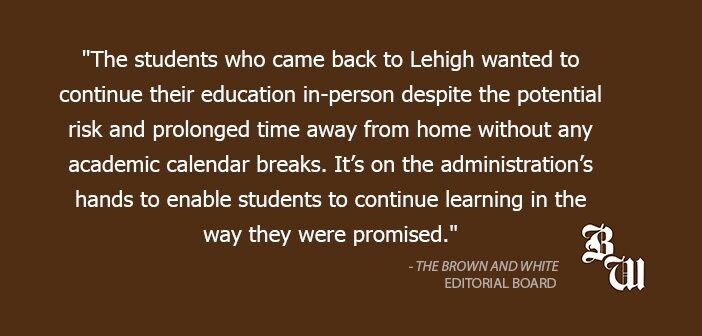Disclaimer: This editorial was written and published before Lehigh announced it had changed its testing protocols for the fall semester.
Throughout the course of the entire reopening conversation, planning and actual start of the fall 2020 semester, Lehigh University has shown time and time again that clear communication is not its strong suit.
The same weaknesses are on full display in the school’s testing protocol.
Although only first-year students were permitted to live on-campus this fall, all students who did not opt for the “fully remote” option for this semester were required to be tested twice, one week apart, during the first two weeks of classes. First-year students were also required to take an at-home test prior to move-in to ensure that no one was bringing the virus to campus upon arrival.
While these initial testing protocols were sufficient for the time being, there have yet to be any routine surveillance tests administered since the first two weeks of the semester. We are now in Week Five. Since the university’s last COVID-19 dashboard update, there were a grand total of seven off-campus positive cases, zero on-campus cases and 28 students in quarantine.
While these low numbers may seem like healthy trends, there’s no way for the university to know how healthy our community actually is. It appears the administration’s approach follows the dogma of “ignorance is bliss,” and now after two rounds of very healthy and positive results, they’ve thrown their hands up and said that’s enough.
By not continuing to test students, Lehigh does not actually know if the school has zero positive on-campus cases. It’s actually inaccurate.
And by not testing students, Lehigh is essentially declaring that asymptomatic spread does not occur. Lehigh, through its testing plan, is walking a very fine line and is putting especially older staff and faculty members at risk just for doing their jobs.
In addition, the Health and Wellness Center has changed their testing availability policy to only allow symptomatic students receive testing at any point for the rest of the semester, as the plan currently stands.
We understand that the first two weeks of the semester are the most dangerous and likely to create the most new cases. With students traveling back to Bethlehem from all over the country, it makes sense to be the most concerned throughout the first 14 days of classes. But that doesn’t mean Lehigh shouldn’t be concerned with the remaining two-and-a-half months of partially in-person instruction, open libraries and dining halls and students living in dorms.
It is actually to the university’s benefit to continue testing routinely as the semester progresses and the seasons change. As we learned from the elevated situation in March, outbreaks lead to refund checks. And Lehigh certainly doesn’t want any more of those.
Nobody wants to go home, and nobody wants to deal with the repercussions of a semester cut short. The students who came back to Lehigh wanted to continue their education in-person despite the potential risk and prolonged time away from home without any academic calendar breaks. It’s on the administration’s hands to enable students to continue learning in the way they were promised.
If Lehigh chooses to no longer test for the remainder of the semester, they still lose. The possibility for the virus to make its way onto campus is still a viable threat and isn’t one that should be taken lightly.
And no, it’s not just on students to make this work. Everyone plays a role. We take our self-assessments, we complete our trainings, we avoid large gatherings and we wear masks. The school, though, needs to do its part, live up to its end of the bargain and provide us the necessary testing to keep us safe.
Campus mindset starts from the top. When the administration creates the notion that since the community is healthy at the beginning and that we no longer need to monitor down the line, the mindset that we no longer need to be as cautious and worried trickles down.
The administration has continued to preach the attitude that we are all in this together.
Consider the word “all.” The Oxford Dictionary defines all as “used to refer to the whole quantity or extent of a particular group or thing.”
That thing is our semester, 12 weeks of in-person instruction, not just the first two.
That group is our faculty. Our staff. Our student body, regardless of where they may be living this semester.
For students living off-campus who have tested positive, they were simply told to quarantine for 14 days and were given no further assistance. There were no opportunities for the roommates of those who tested positive to get a test if they didn’t show symptoms.
Other schools across the country who have far more routine testing in place also have strict protocol for student quarantines regardless of their living situation.
For example, the University of Notre Dame has reserved an entire hotel for students to be placed in isolation should they test positive or come in contact with someone who has tested positive. They have daily needs met as well as a strict retesting protocol that involves multiple additional PCR and rapid antigen tests for both on and off-campus students.
It is evident that Lehigh and the administration have not fully thought through or implemented any plans to continue testing. And if they have such plans, they have yet to communicate them to the rest of the Lehigh community in any way.
Encouraging social distancing and mask wearing is a great start, but it is far from all that needs to be done to ensure a safe campus environment. We demand that Lehigh steps up to the plate and provide its students and staff with the resources to remain healthy and knowledgeable about the threat the coronavirus plays to our school.





Comment policy
Comments posted to The Brown and White website are reviewed by a moderator before being approved. Incendiary speech or harassing language, including comments targeted at individuals, may be deemed unacceptable and not published. Spam and other soliciting will also be declined.
The Brown and White also reserves the right to not publish entirely anonymous comments.